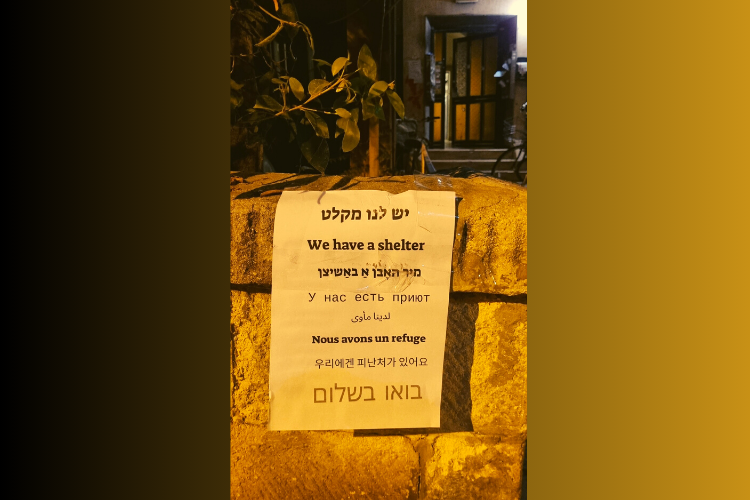
Avigail Sperber
“We Have a Shelter”–A Sign That Says Everything
We have a shelter.
A simple sign posted on the stone entrance of a four-story apartment building on 3 Shulamit Street near Dizengoff Square in central Tel Aviv glows in the yellow slanting light, inviting passersby to take refuge if a siren sounds to warn of an impending rocket barrage. “We have a shelter”, it informs in Hebrew. The word ‘bomb’ before shelter is implied. A simple sheet of A4 white paper announces in black letters. English follows the Hebrew, and then the same invitation is translated into Yiddish, Russian, Arabic, French, and Korean (thank-you, Google translate).
The multi-lingual offer concludes with slightly larger letters in Hebrew: “Come in Peace”.
During wartime, this sign can be a lifesaver. Literally. Because when the Red Alert siren blares in the starless dark, you’ve got 90 seconds to run for cover – and once sheltered, you’re supposed to stay put for an additional ten minutes. Neighbors, pedestrians, foreign workers know that that building has a bomb shelter and they’re welcome to take refuge. Many older buildings in Tel Aviv don’t have such shelters nor do they have government-mandated sealed rooms constructed in newer buildings deemed safe during rocket or missile strikes. Since war broke out on October 7th, that rising and falling wail warning of incoming rockets occurs a few times a week, sometimes a few times in one night. Knowing the location of a bomb shelter that’s open, accessible and nearby enables normal routine, be it walking the dog or going for a run. You can live more of your ordinary life. Simple signs posted around Tel Aviv and cities nationwide direct people to the closest merkhav mugan, Hebrew for protected space, that safeguards against shrapnel and blast from conventional weapons as well as biological and chemical weapons; words and arrows direct pedestrians: Go thataway to safety.
Those signs are practical. Informative. Functional.
But the homemade sign posted by Avigail Sperber, a filmmaker, mom and activist who owns an apartment in that building, is so much more than a communal public service announcement.
It’s an invitation. When scary danger ruptures the sky, come be with us.
Folks going about their business have been scuttling in to take shelter, explained Sperber. Comfortably designed for 10, the shelter had housed up to 30, new faces joining the regulars. Sperber’s two sons, Ori, 15, and Ishai, 9, habitually serve salted popcorn cooked on the stovetop. (They grab the always-full silver bowl that lives on their dining room table.) Conversation is punctuated by new dogs barking at old ones. Infectious smiles come from 6-month-old Libby sporting comfy pajamas and kissable cheeks.

Sperber understood that her little announcement resonated with a communal need. So she decided to inspire others to follow suit. She posted photos of her sign on Facebook with Hebrew text that blended the whimsy with the ceremonial.
“Ours is not a fancy neighborhood,” she quipped, quoting the opening lyrics of a much-loved Israeli Educational Television series theme song from the 1970s called “The children from the Hayim (life) neighborhood”. “But we’re fond of our neighbors.” This invokes the refrain from a classic Israeli children’s book penned by beloved Israeli poet Leah Goldberg. Quoting the Aramaic invite that opens the Passover Haggadah, Sperber added “Kol dikhfin – yatay veyochal. Anyone who is hungry, come in and eat. (In modern parlance, that’s the most open invitation there is.) “So if you’ve got a shelter in your building, invite your neighbors in to pass moments of grace.”
And although I live in Jerusalem where few sirens have sounded and no rockets have fallen, and I actually do have a bomb shelter in my building, I’m buoyed by this sign. My tightened heart uncoils and my face breaks out into a full smile when I see it. The providential kindness calms me. It radiates hope, a transformative power. These days, a precious resource. One gone missing.
I want to climb into that sign’s invite. Where different kinds of people mix to spend those moments of grace.
I want to take refuge in that shelter, where people who speak and read Hebrew and French and English and Arabic and Yiddish and Russian and Korean join together in peace. Where we shelter from rockets violence, and heart-pain. Where barriers are erased.
I want to bring my bleeding country into the shelter, all of it, and Jews everywhere who fear antisemitism (which should not be hyphenated because it’s just a sanitized term for hating Jews). I’d like to shelter innocent civilians of Gaza, although that doesn’t feel possible right now.
A shelter that lets in the light.
We have a shelter. God is a shelter.
We have a shelter. Words are a shelter.
We have a shelter. Empathy is a shelter.
We have a shelter. Writing is a shelter.
We have a shelter. We have a We. We shelter. Physically, and otherwise.
A chain of open hearts. It’s a small thing. But it’s also everything.
Pass it on.
Ruth Ebenstein is an American-Israeli journalist, historian, public speaker and peace activist. She is writing a memoir about an Israeli-Palestinian friendship begun in a breast cancer support group.



